|
|
|
Sort Order |
|
|
|
Items / Page
|
|
|
|
|
|
|
| Srl | Item |
| 1 |
ID:
133671
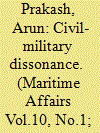

|
|
|
|
|
| Publication |
2014.
|
| Summary/Abstract |
The civil-military equation has been assigned great significance in the national security matrix, and experts consider that nations that fail to evolve a stable paradigm of civil-military relations squander their resources and run grave security risks. In India, this issue has failed to receive the importance it deserves because of the general indifference of the politicians to national security affairs on one hand, and the vested interest of the bureaucracy in maintaining the status quo on the other. It is believed that civil-military relations constitute a zero-sum game in which "civilian control" is retained by reducing the power of the military vis-à-vis the civilians. An irrational but subliminal fear of the military has led the Indian politicians to skew the civil-military equation in favour of the bureaucracy and, in a paradigm unique to India, to place the military under their control. Pointing to the military's sense of grievance and the vitiated atmosphere that prevails in the Ministry of Defence, the author reflects on the price being paid by the nation for endemic "civil-military dissonance" in terms of major national-security shortcomings, as well as the damage being inflicted on the institution of our armed forces.
|
|
|
|
|
|
|
|
|
|
|
|
|
|
|
|
| 2 |
ID:
133676
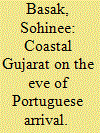

|
|
|
|
|
| Publication |
2014.
|
| Summary/Abstract |
History helps in understanding as well as in formulating policies. India being a peninsular country, various maritime dimensions have played a very important role in moulding its history. The paper attempts to study the Gujarat coast on the eve of the Portuguese arrival in the region as a colonial power in the 16th century. The paper roughly studies coastal Gujarat in the 15th century and the first few decades of the 16th century, by tracing the indigenous market systems, trade routes and commodity transport network, and studies the factors that paved the way for Portuguese dominance in the region.
|
|
|
|
|
|
|
|
|
|
|
|
|
|
|
|
| 3 |
ID:
133677


|
|
|
|
|
| Publication |
2014.
|
| Summary/Abstract |
Growing concerns about the slow revival of the world economy, volatility in oil prices, overcapacity in shipping and fierce competition is denting profits in the shipping industry. On the other hand, emergence of greenhouse gas emissions and pollution control regimes at sea is forcing ship owners to make expensive technical modifications onboard ships, which are further driving up the costs of operations. In such a rapidly changing scenario, there is a need for a long-term vision for transitioning to an era of sustainability in the international shipping industry. The paper commences with a discussion on the concept of sustainability as applicable to the shipping industry and highlights the recent developments in the maritime domain, which pose significant environmental and economic challenges for the shipping industry. It identifies the emerging trends in the shipping industry and argues that these challenges also present a window of opportunity for the industry, for undertaking a paradigm shift towards sustainable shipping. It further explores the transition pathways and presents various options that can be implemented in the shipping industry, which will aid its transition towards sustainability. Using a case study, the paper highlights the key characteristics of sustainable shipping and briefly discusses the Indian maritime scene before concluding that the adaptability of the world shipping industry to adopt the practices of sustainability is fundamental to its survivability in forthcoming decades.
|
|
|
|
|
|
|
|
|
|
|
|
|
|
|
|
| 4 |
ID:
133673
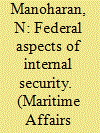

|
|
|
|
|
| Publication |
2014.
|
| Summary/Abstract |
The characteristics of Indian federalism are unique. The uniqueness is conspicuous by its dual character: "federal during normal times, but unitary in times of war". The study examines how such a federal set-up impinges on India's internal security management, including maritime and coastal security. Despite being in a stronger position constitutionally, the Centre has not been assertive. Finding out various reasons for the Union's hesitancy, the study advocates a stronger role for the Centre in internal security issues. The main reason being the threat matrix to India's internal security is such that it is beyond the capability of the States of India to counter them on their own, effectively. After analysing various constitutional and legal aspects of internal security, the study makes some key recommendations. It advocates the need for the Centre and the States to combine their efforts instead of blaming each other for internal security problems. "Cooperative Federalism" instead of "Competitive Federalism" is the suitable way ahead.
|
|
|
|
|
|
|
|
|
|
|
|
|
|
|
|
| 5 |
ID:
133674
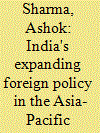

|
|
|
|
|
| Publication |
2014.
|
| Summary/Abstract |
A major feature of India's foreign policy in the post-Cold War era has been its increasing economic, political and strategic engagement with the Asia-Pacific region, a process that began in the 1990s as India's "Look East Policy". However, New Delhi's eastward expansion, despite sharing many commonalities with New Zealand, has not yet resulted in any substantial relationship with Wellington, be it in the field of politics, economic or defence/security. Despite attempts taken in the last two decades, India's engagement with New Zealand in terms of overall bilateral relationship is still untapped. There is ample scope for these two countries to collaborate and engage themselves in a wide-range of issues encompassing economic, political and strategic aspects of their bilateral relationship, with focus on a closer security partnership to deal with the emerging challenges from traditional and non-traditional threats in the region.
|
|
|
|
|
|
|
|
|
|
|
|
|
|
|
|
| 6 |
ID:
133675
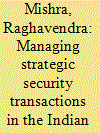

|
|
|
|
|
| Publication |
2014.
|
| Summary/Abstract |
The Indian Ocean Region (IOR) presents a unique tapestry of correspondences and divergences, positive and negatives, in an era of flux with world order, most likely, on the cusp of a systemic reordering. The geo-strategic salience of this region, as part of a larger global maritime continuum, has also increased. Strategic hedging behaviour by major stakeholders, resident and non-resident alike; besides securitisation of geo-political discourse that focuses on competitive aspects also present distinctive challenges for evolving a cooperative framework tailored to regional needs. The key issues examined for obtaining a pan-regional politico-strategic rapprochement are the tenets of critical geopolitics, game theory, geography, context and the efficacy of existing multilateral mechanisms, especially Indian Ocean Rim Association (IORA). The overall aim is to examine the various intertwined threads for formulating an inclusive and multi-sectoral maritime security framework with an IOR contextualisation.
|
|
|
|
|
|
|
|
|
|
|
|
|
|
|
|
| 7 |
ID:
133672
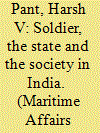

|
|
|
|
|
| Publication |
2014.
|
| Summary/Abstract |
These are difficult times for civil-military relations in India. They may appear normal superficially but lurking beneath the surface are serious differences. "More than ever the balance between the Indian state, the Indian society and the nation's military institutions is out of kilter. This can have grave implications if the equilibrium is not promptly restored because only nations which are successful in evolving a properly balanced pattern of civil-military relations succeed in their search for security while those who fail, merely end up squandering their limited resources and put their national security at risk". While the Indian State cannot absolve itself of the way it has handled the nation's military, Indian military also needs to do some serious introspection. "Blaming the government for all the ills afflicting the defence sector seems to be becoming the default position within the ranks of the military and taking this too far can be really dangerous for the liberal democratic ethos of this nation".
|
|
|
|
|
|
|
|
|
|
|
|
|
|
|
|
|
|
|
|
|